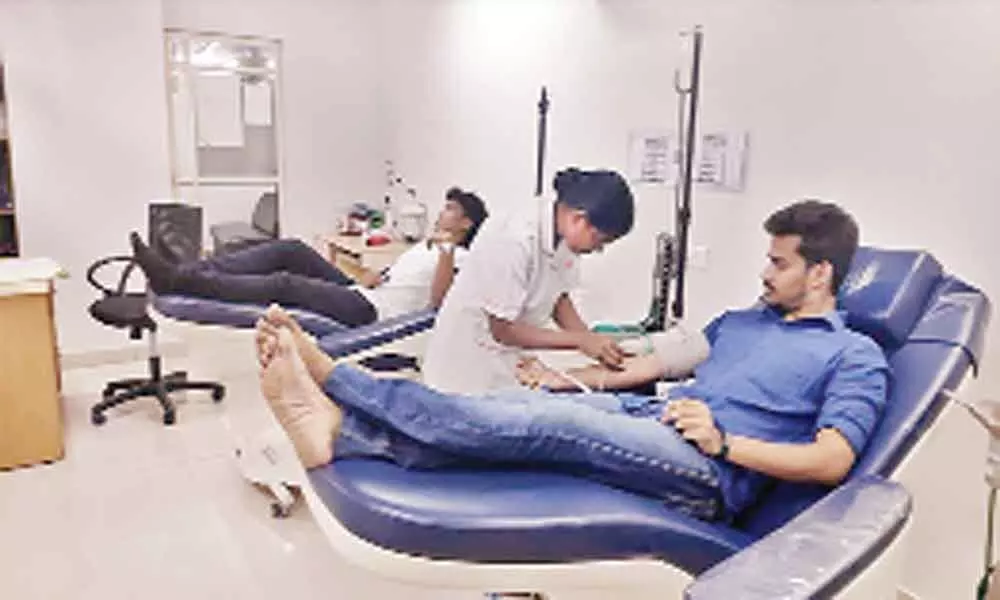Live
- Assam only state to see dip in road accidents: CM Sarma
- MP BJP to celebrate former PM Vajpayee's birth anniversary on Dec 25
- Christmas Eve 2024: Heartwarming Messages To Share With Your Loved Ones
- PM Modi holds brainstorming session with economists in run-up to Budget
- “Telangana Ready to Support AI Technologies That Drive Social Impact,” says Special Chief Secy, Jayesh Ranjan at Woxsen University’s Future Tech Summit 2024
- Hero Motosports Team Rally Announces Squad For Dakar Rally 2025
- Two Men Found Dead In Parked Caravan In Kerala
- Mandhana moves closer to top spot in ODI, T20I rankings
- IND vs AUS Boxing Day Test 2024: Sam Konstas Debuts, Travis Head’s Fitness in Question
- Congress Challenges Election Rule Amendments In Supreme Court
Just In

The ‘Blood Hub India’ initiative is a move by Akhil and John, final year engineering students from Gitam, to bridge the extreme gap between the necessity and unavailability of blood in the country.
Hyderabad: The 'Blood Hub India' initiative is a move by Akhil and John, final year engineering students from Gitam, to bridge the extreme gap between the necessity and unavailability of blood in the country. The conventional time required for a donor search is reduced from days to minutes by the database model of Blood Hub.
- Time required for a donor search is reduced from days to minutes by the database model of Blood Hub
- On an average, about 38,000 blood donations are required in India every day
- The website http://www.bloodhub.in offers 3 main services - Request for blood, search for donor and register as donor
"All registered users can simply look up for available donors, and reach out to them immediately. The Blood Hub is an efficient way to handle the unavailability of blood anywhere anytime. We envision building the largest hub of blood donors in the country and serving the society in the greatest service of all, i.e. blood donation," says both the innovators.
On an average, about 38,000 blood donations are required in India every single day. The number of lives lost, owing to the unavailability of blood is beyond official statistics. India lags in the necessity of blood by almost about 30,00,000 units every year.
As for the cities that house these blood banks, the cost of saving a life comes at a price. Anything between Rs.600 to Rs.1500 is charged for a single unit. As such, there arises an unavoidable paradox between the unavailability of blood and the necessity to pay excessive process when it is available. As an alternative to regretting about the unavailability of blood, one can now look forward to seek blood when required in The Blood Hub.
"The idea is to establish a hub of prospective blood donors, who can be contacted immediately upon necessity. This manner of contacting live donors upon demand ensures that blood is immediately available, without paying the excessive costs demanded by the blood banks.
The Bood Hub is an efficient manner of maintaining and retrieving the data of available donors in times of urgent requirements. As the first of its kind in the country, we look forward to making the initiative a success, and giving our part in service to the nation. People live when people give, and at Blood Hub, we believe in giving all we can, for the sake of humanity," said Akhil.
"The online portal for the initiative has been hosted at http://www.bloodhub.in and the website offers three main services as part of the whole plan such as Request for blood, Search for Donor and Register as donor. We have a separate login portal for NGOs to manage the data up to a certain limit. We're looking forward to collaborate with more NGOs and Hospitals to help more and more people, so far we have registered with 150 organizations to serve India in a better way," said Jhon.
Situations where patients need blood
- A patient needs blood after a major accident or surgery in which there is loss of blood.
- For every open heart surgery, about six units of blood are required.
- After a miscarriage or childbirth, the patient may need a large amount of blood for saving mother and child's lives.
- patients with blood diseases like severe anemia, leukaemia (blood cancer), haemophilia (bleeding disorder), thalassemia, etc.
- In situations like poisoning, drug reactions, shock and burns, blood transfusion is the only way to save precious human life.
Kinds of Donors
- Professional blood donors – they sell their blood, which may be of very poor quality and can transmit dangerous diseases to the recipient.
- Replacement blood donors – healthy relatives and friends of the patient give their blood, of any group, to the blood bank. In exchange, the required number of units of the required blood group is given to the patient.
- Voluntary blood donors – here, a person donates blood voluntarily. The blood can be used for any patient even without divulging the identity of the donor. This is the best type of blood donation where a motivated person gives blood in an act of selfless service.

© 2024 Hyderabad Media House Limited/The Hans India. All rights reserved. Powered by hocalwire.com







